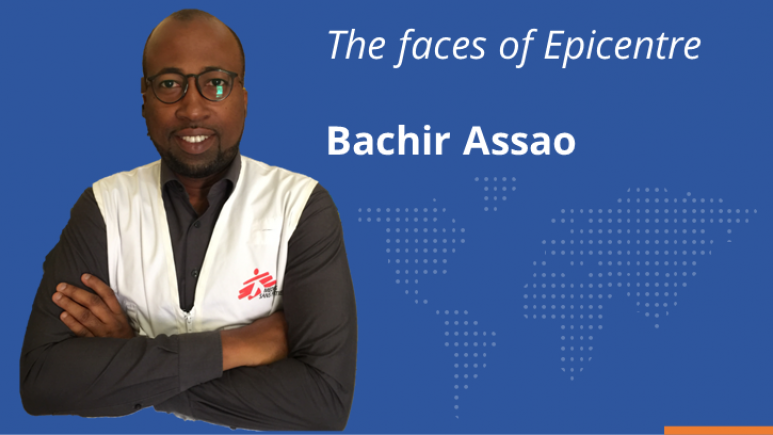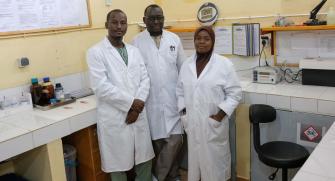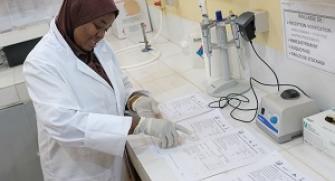Bachir Assao: public health as a leitmotiv
Bachir Assao, epidemiology coordinator at Epicentre's Maradi Research Center in Niger, completed his public health specialization in 2016 and already has a long history of experience behind him. This experience will be enriched by a PhD in zoology, which he will begin in the fall of 2022 thanks to funding from the University of Florida. "This does not mean that I am cutting ties with Epicentre," he explains. The idea is that I will put my PhD projects into practice in Epicentre's Niger Center."
Bachir Assao will join a lab that studies the dynamics of infectious diseases such as dengue and malaria at the University of Florida. "This lab explores with computer tools and modeling the links between the ecology and evolution of pathogens to better understand their transmission. I then hope to use these new technologies to understand the spread of epidemics in Niger and contain them." This is not a new field for Bachir Assao, as Robert Nsaibirni and he set up Alert Niger, an electronic surveillance and alert platform initially deployed to deal with the COVID19 pandemic. Alert Niger is based on a structured alert data collection system to ensure efficiency and completeness. This platform is now used by the Nigerian Ministry of Health for recurrent diseases such as measles and meningococcal meningitis. Community health workers, health workers at specialized call centers, and hospitals issue alerts that are then investigated to identify and test suspected cases.
Coping with the various epidemics that threaten the region
To set up this platform, Bachir Assao was able to draw on his multiple experiences in infectious diseases. First, during his master's degree in the United States on a Fullbright grant, he participated in the MenAfriNet consortium to evaluate the implementation of the MenAfriVac® vaccine in the African meningitis belt. Prior to 2009, all epidemics of this meningitis were caused by Neisseria meningitidis serogroup A. Vaccination of more than 300 million people with MenAfriVac® resulted in a 99% decline in the incidence of bacterial meningitis caused by this serogroup in the 22 countries where the vaccine was introduced. But since then, other serogroups have emerged, including Neisseria meningitidis serogroup C in Niger.
"It is now a matter of strengthening surveillance for these new serogroups and detecting a possible resurgence of serogroup A with a very poor prognosis," says Bachir Assao. In 2017, he also participated in a clinical trial to evaluate ciprofloxacine as an alternative to vaccination during meningitis outbreaks. While the initial results of this randomized phase 3 trial led to a WHO recommendation, the additional studies needed to go further could not take place due to the lack of an epidemic in Madarounfa, the trial site.
As for malaria, one of the infectious diseases that most affects the populations around Maradi where the Epicentre research center is located, the studies to which Bachir Assao contributed focused on seasonal chemoprevention (SMC) and the evaluation of its effectiveness. This preventive approach consists of a complete course of treatment with sulfadoxinepyrimethamine (SP) and amodiaquine (AQ) administered to children aged 3 to 59 months at one-month intervals, starting at the beginning of the rainy season when transmission is highest. While it limits the occurrence of resistance, its strategic implementation still poses many questions. During this study, we showed that the prevalence of parasitaemia was high in children aged 5 to 9 years, which would justify considering their inclusion in SPC programs," says Bachir Assao. But the result that surprised us the most was that malaria infection is widespread in this region, even during the non-rainy season when the incidence of clinical malaria is low."
In 2018, Bachir Assao also conducted seroprevalence surveys for hepatitis E in refugee camps in Diffa that had been plagued by outbreaks of this hepatitis for which there is no treatment to date and which has a mortality rate of up to 25% in pregnant women. This is not my best memory in terms of a study," explains Bachir Assao. Unfortunately we were not able to get enough samples and therefore no results, but it illustrates the difficulties associated with conducting such a study in difficult conditions."
After missions in South Sudan and the DRC, Bachir Assao returned to Maradi to coordinate the response to epidemics of meningitis, measles and cholera in conjunction with the Ministry of Health. I began to familiarize myself with dashboards and risk anticipation based on epidemiological and laboratory data," explains Bachir Assao. To go further and build models to try to contain epidemics and administer vaccines, for example, at the right time and in the right place, Bachir Assao plans to do a PhD. In early 2022, he obtained a 5-year funding to join the University of Florida and focus on the study of malaria and mosquito-host interaction. "The idea is that I will spend two years in the lab in Florida and then return to Maradi to continue my PhD in a real-life situation," concludes Bachir Assao, who already hopes to make a contribution to the fight against malaria, which is responsible for 50% of deaths in the country.









